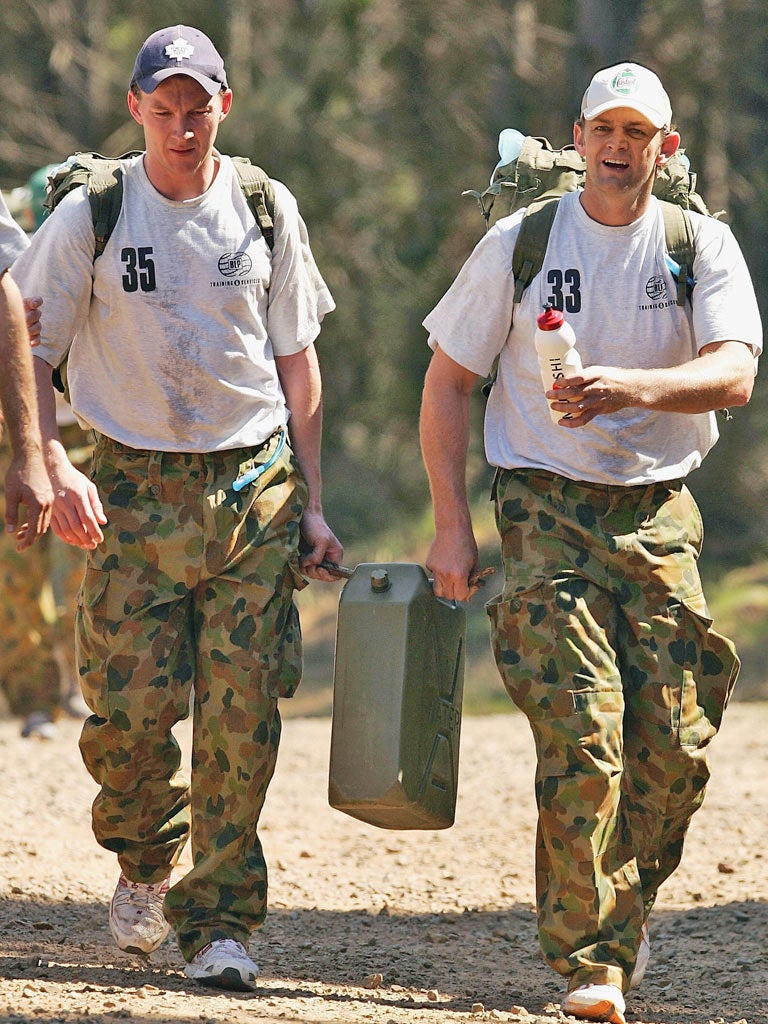Has boot-camp bonding gone one step too far?
As Ricky Ponting prepares for three days of pain, Robin Scott-Elliot explores the bizarre and brutal methods teams will use for extra edge

For Shane Warne it meant a choice between clean pants and a supply of cigarettes. He chose cigarettes. Andy Flower believes it broadens minds, while the thoughts of South Africa's rugby players after being forced to lie naked in a foxhole as ice-cold water was thrown over them to the strains of "God Save the Queen" do not take much imagining.
From the brutal through the psychobabble to the bonding, the sporting boot camp has a broad and chequered history and for three days in Melbourne shortly before Christmas it will have another addition – to be filed in the deeply humbling section.
Between them, Ricky Ponting, Michael Hussey, Brad Haddin, Michael Clarke and Shane Watson have played 371 Tests, scored 27,441 runs and amassed 76 centuries, yet have been instructed to turn up at the Melbourne Cricket Ground on 20 December for what has been labelled Down Under as a batting boot camp.
Australia's alarming slump to lose the second Test against New Zealand earlier this week was not the first time this year their batsmen have collapsed into a markedly un-Australian heap, and so Mickey Arthur – the team's new coach – has summoned the guilty parties to what used to be known as "naughty-boy nets". If it works as well as Australia's last use of such a process then it may be worth a punt on Ponting and Co earning a home win in their upcoming series against India.
Ahead of the 2006-07 Ashes, John Buchanan ushered his squad into the bush for four days. The cricket that followed saw England soundly beaten. Ponting said the time they spent in Queensland was beneficial to their performance in the Ashes.
Warne was less willing to buy into the process. "We were allowed three pairs of underpants, three pairs of socks, and they gave us an extra T-shirt," recalled Clarke. "They then said Warnie had to remove one thing from his backpack for one packet of cigarettes, so Warnie flicked his undies, flicked all his socks and filled the backpack with cigarettes."
England did something similar, in Germany rather than the outback, before last winter's successful Ashes campaign, even though the England camp insisted yomping around woods and sleeping in tents was not a boot camp. "We can live in a cosseted world," Flower said, "and this is there to broaden minds. It's about development as a group of blokes."
However, what Rudolph Straeuli laid on for his South Africa squad ahead of the 2003 World Cup was harsher still. Straeuli later said he wanted to rid the team of individuality and so they were subjected to a succession of humiliations at Kamp Staaldraad – Camp Barbed Wire.
The players were dispatched into the bush with an egg, a chicken and a match, and instructed to cook a meal but not eat it. The instructors then broke the eggs over the players' heads to check whether they were cooked. And that was before they were asked to strip. With their clothes back on they went out to New Zealand in the quarter-finals and Straeuli was hurriedly moved on.
Wales and France chose to inflict boot camps on their players ahead of this year's Rugby World Cup. The Welsh players endured a gruelling two-week trip to Poland, including spending time in a cryogenic chamber. The players happily endorsed the trip and it laid the foundations for their performance in New Zealand.
Ponting's productive years have been marked by an utter professionalism, and it would come as a surprise if he did not, in public, embrace it. But still, for a man approaching his 37th birthday, it appears another ignominious moment in the twilight of an otherwise great career.
Subscribe to Independent Premium to bookmark this article
Want to bookmark your favourite articles and stories to read or reference later? Start your Independent Premium subscription today.

Join our commenting forum
Join thought-provoking conversations, follow other Independent readers and see their replies